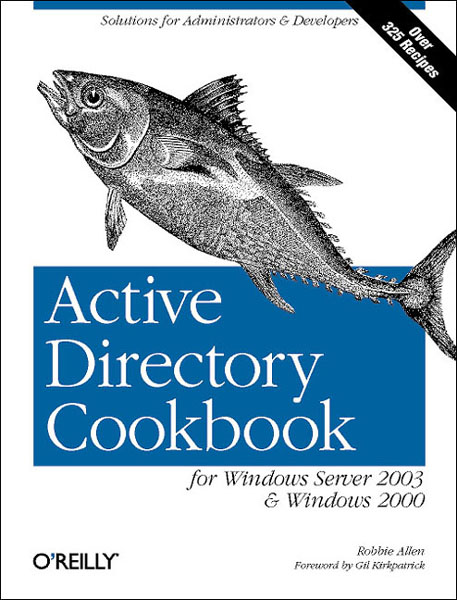- View more resources from this publisher
 O'Reilly Media Inc
O'Reilly Media Inc
Active directory cookbook for Windows Server 2003 and Windows 2000

The newer version included with Windows Server 2003 has over 100 new and updated features to simplify deployment, but once it's in place many system administrators still find Active Directory challenging.
The book contains hundreds of step-by-step solutions for both common and uncommon problems that you might encounter with Active Directory on a daily basis--including recipes to deal with the Lightweight Directory Access Protocol (LDAP), multi-master replication, Domain Name System (DNS), Group Policy, the Active Directory Schema, and many other features.
Author Robbie Allen, a Senior Systems Architect at Cisco Systems and co-author of our Active Directory tutorial, based this collection of troubleshooting recipes on his own experience, along with input from Windows administrators throughout the industry.
Each recipe includes a discussion to explain how and why the solution works, so the reader can adapt the problem-solving techniques to similar situations. If the readers company is considering an upgrade from Windows NT or 2000 to Windows Server 2003, the Active Directory Cookbook for Windows Server 2003 & Windows 2000 will help reduce the time and trouble it takes to configure and deploy Active Directory for the network.
This Cookbook is also a perfect companion to Active Directory, the tutorial that experts hail as the best source for understanding Microsoft's network directory service.
While Active Directory provides the big picture, Active Directory Cookbook for Windows Server 2003 & Windows 2000 gives you the quick solutions the reader needs to cope with day-to-day dilemmas.
Together, these books supply the knowledge and tools so the reader can get the most out of Active Directory to manage users, groups, computers, domains, organizational units, and security policies on your network.
Show health and safety information
Please be aware that resources have been published on the website in the form that they were originally supplied. This means that procedures reflect general practice and standards applicable at the time resources were produced and cannot be assumed to be acceptable today. Website users are fully responsible for ensuring that any activity, including practical work, which they carry out is in accordance with current regulations related to health and safety and that an appropriate risk assessment has been carried out.





